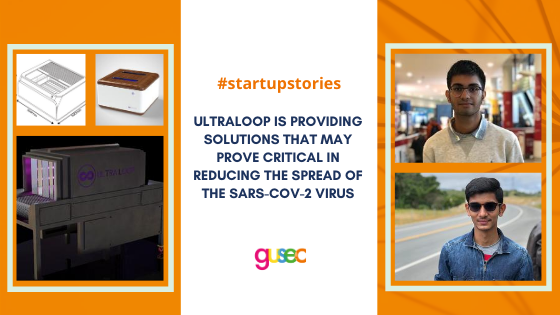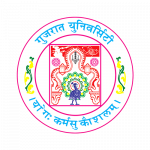Startup Story: Ultraloop is providing solutions that may prove critical in reducing the spread of COVID-19

In the aftermath of the Coronavirus pandemic, agencies around the world are trying to come up with ways to prevent the spread of the virus. Read how Aditya Bhatt & Yash Bansal of Ultraloop, a startup incubated at GUSEC through the Breakthrough Accelerator, are doing their bit.
It is no secret that the novel Coronavirus has toppled our way of living as we knew it. Dining outside, moving in crowds, even shaking hands will never be the same again. While various organisations around the world are trying to aid governments and the public in fighting off the virus, in April 2020, GUSEC in partnership with the United Nations International Children’s Fund (UNICEF), launched the Breakthrough Accelerator, a special program for incubating startups that would directly help counter the effects of the pandemic. Of the total 445 applications received, 27 ideas were onboarded, with 157 applications still awaiting scrutiny. One of those 27 ideas was Ultraloop, spearheaded by Aditya Bhatt & Yash Bansal.
Ultraloop is a germicidal lamp that reduces surface-to-human transmission using UV-C light to disinfect personal belongings and PPE kits and is fit to be used at warehouses, grocery shops, schools and colleges, banks, residential places, and hotels. It can also prove crucial in sterilising medical equipment, N-95 masks, and PPE, thus enabling their reuse and reducing the pressure on the PPE inventory. Not just this, Ultraloop Oven, modelled for domestic purposes, can be used to disinfect items like groceries, vegetables, utensils, even electronic equipment like mobile phones and laptops, and other household items. The Oven works on multiple surfaces like plastic, paper, metal, leather as well as fabric. Moreover, as the UV-C light doesn’t use chemicals, Ultraloop can also decontaminate food without the fear of any residue chemicals.
Currently an engineering sophomore, Aditya is an electronics and a robotics aficionado and has been working on related projects since he was 11. At 16, he established AMB Industries (also incubated at GUSEC), a startup that builds revolutionary products in the energy domain and aims to solve some of the most pressing societal challenges using technology & community engagement.
Aditya’s inspiration for Ultraloop came while he was returning to India from the US in March 2020, when he saw through the loopholes in the sanitisation techniques that were being used, most of which consisted of alcohol-based disinfection. He also realised that the pandemic would be prolonged and would create more avenues of infection once the restrictions of the lockdown were eased.
For this purpose, Aditya & Yash did detailed research about possible solutions, going through many established research papers in the process, when they came across facts about the high efficacy of UV-C light in controlling the SARS virus that had disastrously impacted the world in 2003 and was also being used in China to deter the spread of the infection of the SARS-CoV-2 Virus.
Yash & Aditya got Ultraloop incubated at GUSEC in April, through the Breakthrough Accelerator, while still in the idea stage, but managed to develop the prototype in just two-and-a-half weeks. “It was a record time for ourselves, for any company, I would say, to have developed a prototype in such a short time; that too, at a time when the lockdown was the most severe” Aditya remarks. Ultraloop has been running pilots to test the device for more than two months now and got their ISO & CSIR certifications approved this week.
Ultraloop plans on expanding their products in both, the B2B & the B2C industry, with the Ultraloop conveyor belt to be sold to public places like hospitals, malls, airports, etc., while Ultraloop Oven, the consumer version, to be introduced in the market via an upcoming crowd-funding campaign in the coming weeks. Aditya credits GUSEC for getting them recognition amongst other businesses and enabling them in making B2B connections, while also providing encouraging support throughout the entire operation.
When asked about his motivation for innovation, Aditya says, “I’ve always wanted to create value in the community with impactful innovations that bring positive changes in the society, and I plan on continuing to strive for the same, especially through consumer electronics and robotics.”
I’m not going to shy away from the fact that the pandemic has proven to be disastrous in a lot of aspects. Countless people have lost their livelihoods, the economy continues to get worse, and we’re all reliant on the valour of frontline workers for our essential needs. But Aditya & Yash, along with countless other innovators show us how perception can make all the difference.
In many ways, the pandemic reminds me of the Buddhist parable of the Blind Men and the Elephant, where a group of blind men comes across an elephant for the first time, and conceptualise what the elephant is like by touching only a specific part of the animal’s body; drawing conclusions based on their limited, subjective experience. While the ill-effects of this new virus cannot be denied, we can still look at it not as a phenomenon of extinguishing livelihoods, but as an opportunity that gives birth to new ones.




